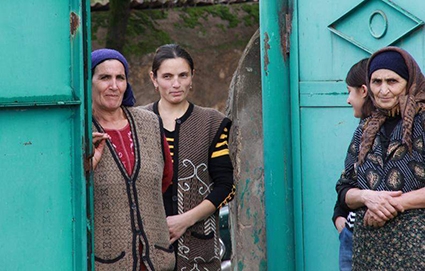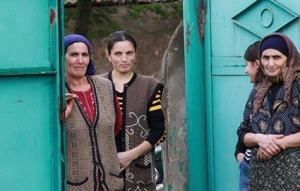Women Fighting for Higher Education
Why should a girl get an education?
Is it possible to see ethnic Azerbaijani women living in Georgia in business, cultural and public life? Are the stories we hear about early marriages of young girls aged 13-15 just one side of the coin? How much attention is paid to the education of young ethnic Azerbaijani girls living in the capital city Tbilisi and to the regions densely populated by the Azerbaijani ethnic group. Do the girls who want to get a higher education, build a career and establish themselves in life get support from their families and relatives, or do they face challenges?
We talked with three women to find answers to these questions. These women, who have been able to get a higher education and build a career, were born into the families of ethnic Azerbaijani.
Turaj Ibrahimova is 29 years old. She is a historian and journalist and producer of an Azerbaijani language news program on local television. She is the head specialist of the department connected with PR, information and community in Marneuli. Turaj comments on education and the problems related t having a career:
“ In our region girls from the majority of families do not want to get an education. Girls are prepared from childhood to be ready to make a family at the age of 13. Families think that if a girl is already able to do washing-up, prepare a meal and tidy the house then she is ready for marriage. For years girls are inspired so they only dream about marriage. Getting an education is boys’ business. In our region they think that a man should protect the family. According to the average statistics, families prepare girls for marriage and boys for shopping and trade. If a boy wants to get an education, he can, but it is not considered necessary for girls. The only things meant for girls are marriage and giving birth to a healthy baby. They think that if a girl is educated she may get used to an independent lifestyle, making it difficult to marry. In my family neitherr my father nor my mother were able to get a higher education. They made it their purpose to give us something which they could not get from their parents and as a result of their support I was enrolled in the faculty of history. After two years I understood that I wanted to get into television . One day I saw an advertisement seeking someone to work on the computer. I decide to apply and was chosen. The next day I began training, which was lasted until late at night. Neighbors started to gossip. They complained to my father, asking how a young girl could come back so late at night, telling him not to let me go there. I told my father that I wanted to work in TV with tears streaming down my cheeks and he decided to support me in my ambitions. After a few months I appeared on screen presenting the news program. My father was really proud of me. It’s important to have the support of your family. It’s impossible without it. My father supported me a lot. I came home late, I took interviews in the streets, I sat with men in tea-houses, prepared reportages, visited ohter countries. All these things didn’t worry him. But there are so many girls who didn’t have such an opportunity. We are growing up in a community where parents decide their child’s future- be it bright or dark.
24 year-old Gulferi Mahmudova is a dentist by profession. At the same time she co-operates with different organizations aiming to improve the educational and cultural level of young people. Her path was not without challenges.
“ I am the first girl to come from the province and get a higher education. In our village everybody was surprised. They were asking my parents how they could let a young girl live in a strange nation. They didn’t like these questions and ignored them because they wanted me to get an education. When I meet my relatives and acquaintances they only want to know if I’m married when I’m planning to tie the knot: no-one asks about my education or work. For them, educating a daughter is a waste of time. I also know families of teachers who have a worse attitude regarding a girl getting an education, especially if she has to go to the city to do it- they think she has a higher change of becoming immoral. Higher education means independence and the ability to think. Educated women ask questions, which is not appreciated by father, brother, or by her future husband. Boys look for a girl without any education. Parents know this that is why they try to give their daughters away in marriage at an early age to prevent it. I was lucky that my family wasn’t against it but I have lots of friends who could not finish their education because of pressure from their families.
Aida Tagieva is Azerbaijani from Tbilisi. She graduated in TV journalism. Right now she works in her specialization and as Chief of the Marketing Department for one of the mobile operating companies. Aida remembers her experience:
“I studied by believing in myself and insisting! In my family nobody made an effort towards education. They understood that I was motivated so they were forced to support me. I was lucky to live in the city already. It’s more difficult to come from the province as the mentality there prevents them from sending their daughters to the city to live alone for the sake of education. There is a religious factor, too. People who live in the province think that people living in big cities are mostly Christians and feel that their girls will be surrounded by different values. They also think that if a girl stays alone she could begin to live an immoral life. They understand education as a freedom and freedom is understood as immoral life. In rare situations, rich families want to give their daughters an education. The reason is not that they want their daughters to have a specialty, but they want it only for prestige and for a diploma. There are families that don’t even know which faculty their daughter is studying at- they are only interested in the final diploma. In such conditions a girl has only one way – being maximally stubborn and hard-working. Only you can achieve everything by yourself. You must withstand a thousand complications. My parents weren’t against my education but they didn’t support me. This was something second-qualitative. A daughter is like burden, money spent on her is an expense. Tomorrow she will get married and the money spent on her will have been for nothing. A boy is a different issue: if he gets an education, he’ll earn money and look after his parents. I’m grateful to my parents that they weren’t against my education. It is distressing to study hard when there is no need for your education neither in your family nor for the person who wants to marry you.












